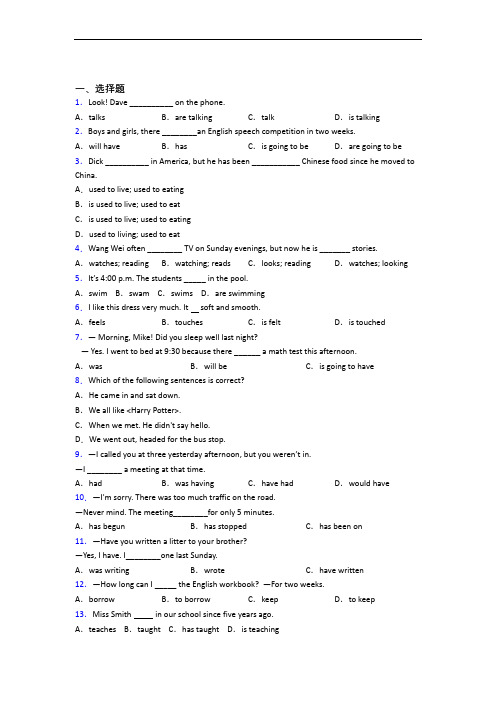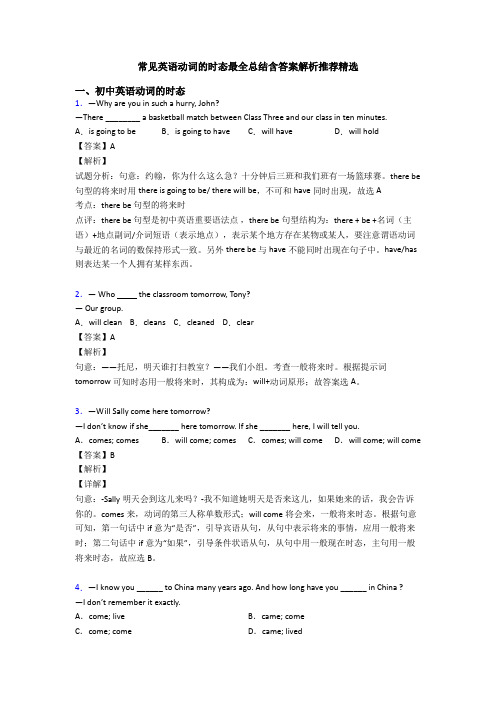初中英语语法知识—动词时态的全集汇编含解析(1)
初中英语语法动词时态详解

A.couldn’t he
B.could he
C.didn’t he
D.did he
第七页,编辑于星期六:点 十三分。
三、现在进行时
1.用法:
A.现刻动作:目前正在发生的动作。 B.现阶段动作:目前一个时期一直在进行的
动作,此刻不一定在进行。
2.标志词:now,Look! Listen!
中考模拟:
1.The film began 5 minutes ago. The film_h_a_s _b_e_en__o_n for 5 minutes.
2.They left an hour ago.
They_h_a_v_e_b__e_en__a_w_afoyr an hour.
3.The man died a week ago.
sometimes, never,every day /week /month/year/…
1.The boy usually_g_e_ts(get) to school early.
2.Light _t_r_a_v_e_ls(travel)faster than sound.
第六页,编辑于星期六:点 十三分。
has been
9.They got to know 10 years ago. They____ ______since 10 years ago.
have known
10.I borrowed the book a week ago. I____ _____the book for a week.
They have gone to Europe.
(They are not here.)
第十九页,编辑于星期六:点 十三分。
初中英语知识归纳总结——动词的时态

初中英语知识归纳总结——动词的时态动词的时态(一)教学重点一般现在时在英语中,不同时间里以不同方式发生的动作或存在的状态,要用不同的动词形式来表示,动词的这种不同形式称为动词的时态。
时态从时间上划分,可分为四大类:现在时;过去时;将来时;过去将来时。
从行为上,每一类可以分为四种形式:一般式;进行式;完成式;完成进行式。
这样英语的动词合起来,总共有十六种时态,初中只需掌握其中的八种时态。
1、一般现在时(1)一般现在时表示现在的状态、习惯性的动作或主语所具备的性格和能力等。
①当动词是be时,第一人称用am,第二人称用is,其他人称用are.②当动词是实义动词时,一般用动词原形,但如果主语是第三人称单数时,动词必须用第三人称单数形式,其变化规则如下:助动词do(第三人称单数用does)构成否定句、疑问句及答语,但要注意助动词后原来的谓语动词要恢复原形。
例如:I like music.I don’t like music.Do you like music?Yes, I do No, I don’t(2)一般现在时的用法①表示经常、习惯性动作,常和often, usually, every day, sometimes, always 等时间状语连用。
如:He goes to school by bus every day.They often play football②表示能力、职业、特征。
如:Miss Gao teaches English.Do you speak Japanese?③表示客观存在。
如:The earth moves round the sun.Time and tide wait for no man.④表示已经安排好或计划好的事。
如The plane takes off at 7:30.Classes begin at 8:00⑤在时间状语和条件状语从句中,主句用一般将来时,从句用一般现在时。
初中英语语法 (1)

初中英语语法—动词的时态总述:英语中动词共有16种时态,下面以动词do为例,其各种时态形式如下表:初中则要求掌握以下八种时态:一般现在时,现在实行时,现在完成时,一般过去时,过去实行时,过去完成时,一般将来时,过去将来时。
1.一般现在时1) 表示经常性或习惯性的动作,常与often、always、usually、every day、sometimes、now and then等时间状语连用e.g. He gets up at six every day.2) 表示主语现在的状态、特征或性格等e.g. She has brown hair.3) 表示普遍真理或客观事实e.g. The earth moves around the sun.4) 在时间和条件状语从句中,用一般现在时表示将来动作e.g. I’ll tell her after you leave.5) 在口语中,有些表示移动的动词,其一般现在时能够表示按规定、计划或时间表要发生的事,句中通常有一个表示未来时间的状语。
这些动词有go,come,leave,arrive,return,begin,start,be等e.g. The Browns come back tonight.6) 以here,there开头的倒装句,一般现在时可表示当前正在发生的动作e.g. Here comes the bus.7) 有少数动词(如say,tell,hear等)能够用一般现在时表示过去发生的情况e.g. I hear you want a servant.2.一般过去时1) 表示过去某个事件发生的动作或存有的状态,一般带有确定的过去时间状语,如the day before yesterday,last night,a few years ago,in 1997等,但有时可不用时间状语而通过情景表示过去时间e.g. My grandmother died last year.2) 表示过去经常或反复发生的动作e.g. I played basketball every day when I was a boy. 【注】①表示过去经常性或习惯性的动作或状态,也可用“used to+动词原形”的结构 e.g. My mother used to go to school on foot.这种结构的否认式和疑问式可用助动词do,也可不用助动词来构成:don’t use to=usedn’t to②有些情况发生的时间不很清楚,但实际上是过去发生的,理应用一般过去时e.g. I was glad to get your letter.3) 在时间、条件状语从句中,常用一般过去时表示过去将来时间e.g. He said he would not stay on even though it rained the next morning.3.一般将来时1) 表示在将来某一时间要发生的动作或状态,常与表示将来的时间状语连用,如tomorrow,the day after tomorrow,in five minutes,some day,in the future,next year等一般将来时有助动词shall或will加动词原形构成。
初中英语语法知识—动词时态的真题汇编及解析(1)

一、选择题1.Look! Dave __________ on the phone.A.talks B.are talking C.talk D.is talking 2.Boys and girls, there ________an English speech competition in two weeks.A.will have B.has C.is going to be D.are going to be 3.Dick __________ in America, but he has been ___________ Chinese food since he moved to China.A.used to live; used to eatingB.is used to live; used to eatC.is used to live; used to eatingD.used to living; used to eat4.Wang Wei often ________ TV on Sunday evenings, but now he is _______ stories. A.watches; reading B.watching; reads C.looks; reading D.watches; looking 5.It’s 4:00 p.m. The students _____ in the pool.A.swim B.swam C.swims D.are swimming6.I like this dress very much. It soft and smooth.A.feels B.touches C.is felt D.is touched 7.— Morning, Mike! Did you sleep well last night?— Yes. I went to bed at 9:30 because there ______ a math test this afternoon.A.was B.will be C.is going to have 8.Which of the following sentences is correct?A.He came in and sat down.B.We all like <Harry Potter>.C.When we met. He didn't say hello.D.We went out, headed for the bus stop.9.—I called you at three yesterday afternoon, but you weren’t in.—I ________ a meeting at that time.A.had B.was having C.have had D.would have 10.—I'm sorry. There was too much traffic on the road.—Never mind. The meeting________for only 5 minutes.A.has begun B.has stopped C.has been on 11.—Have you written a litter to your brother?—Yes, I have. I________one last Sunday.A.was writing B.wrote C.have written 12.—How long can I _____ the English workbook? —For two weeks.A.borrow B.to borrow C.keep D.to keep 13.Miss Smith in our school since five years ago.A.teaches B.taught C.has taught D.is teaching14.When I was young, my mother ___________ by my side all the time.A.stays B.is staying C.stayed D.will stay 15.—Remember the first time we met, Jim?—Of course I do. You ________ in the library.A.were reading B.have read C.will read D.read 16.Look at Amy. She ________ for the school bus.A.wait B.is waiting C.waits D.waiting 17.The water ______ cool when I jumped into the pool for morning exercise.A.was felt B.is felt C.felt D.feels 18.While I_______ a detective story, someone_______ at the door.A.read, was knockingB.read, knockedC.was reading, knockedD.was reading, was knocking19.---Where have you been recently?---I _______ in Hangzhou on business for a week last month.A.have been B.had gone C.had been D.was 20.It’s 8 o’clock. The students _________ an English class.A.have B.having C.is having D.are having 21.With a book in his hand, the boy ________ in bed.A.lie B.lied C.lay D.lying 22.Don’t talk! The baby ________.A.sleeps B.is sleep C.sleeping D.is sleeping 23.— What do you use MP3 for?— I ________ it ________ to music.A.use; listen B.are listening; listeningC.use; to listen D.is listening; to listening24.My father is a teacher and he ___________ in this school for about twenty years. A.works B.is working C.was working D.has worked 25.—How much is the ticket (票) to Central Park?—One ticket $40, and you can $80 for two persons.A.costs; pay B.cost; spend C.pay; spend D.spends; pay 【参考答案】***试卷处理标记,请不要删除一、选择题1.D【解析】【分析】【详解】句意:看!Dave正在打电话。
初中英语语法动词时态详解共32页

1、最灵繁的人也看不见自己的背脊。——非洲 2、最困难的事情就是认识自己。——希腊 3、有勇气承担命运这才是英雄好汉。——黑塞 4、与肝胆人共事,无字句处读书。——周恩来 5、阅读使人充实,会谈使人敏捷,写作使人精确。——培根
初中英语语法动词时态详解
11、获得的成功越大,就越令人高兴 。野心 是使人 勤奋的 原因, 节制使 人枯萎 。 12、不问收获,只问耕耘。如同种树 ,先有 根茎, 再有枝 叶,尔 后花实 ,好好 劳动, 不要想 太多, 那样只 会使人 胆孝懒 惰,因 为不实 践,甚 至不接 触社会 ,难道 你是野 人。(名 言网) 13、不怕,不悔(虽然只有四个字,但 常看常 新。 14、我在心里默默地为每一个人祝福 。我爱 自己, 我用清 洁与节 制来珍 惜我的 身体, 我用智 慧和知 识充实 我的头 脑。 15、这世上的一切都借希望而完成。 农夫不 会播下 一粒玉 米,如 果他不 曾希望 它长成 种籽; 单身汉 不会娶 妻,如 果他不 曾希望 有小孩 ;商人 或手艺 人不会 工作, 如果他 不曾希 望因此 而有收 益。-- 马钉路 德。
(完整版)初中英语语法时态讲解与归纳

(完整版)初中英语语法时态讲解与归纳初中英语语法时态讲解与归纳一、时态的分类英语中的时态包括一般现在时、一般过去时、一般将来时、现在进行时、过去进行时、将来进行时、现在完成时、过去完成时和将来完成时等。
下面将分别进行介绍和归纳。
二、一般现在时一般现在时用于表示经常性的动作、惯、真理等。
其基本结构为:主语 + 动词原形。
例句:- I play football every Sunday.(我每个星期天踢足球。
)- He doesn't like coffee.(他不喜欢咖啡。
)- Does she speak English?(她会说英语吗?)三、一般过去时一般过去时用于表示过去发生的动作或状态。
其基本结构为:主语 + 动词过去式。
例句:- I went to the park yesterday.(我昨天去了公园。
)- They played basketball last night.(他们昨晚打篮球。
)- Did you finish your homework?(你完成作业了吗?)四、一般将来时一般将来时用于表示将来发生的动作或状态。
其基本结构为:主语 + will + 动词原形。
例句:- I will call you later.(我稍后会给你打电话。
)- She will visit her grandparents next week.(她下周会去看望她的祖父母。
)五、现在进行时现在进行时用于表示现在进行的动作。
其基本结构为:主语 + am/is/are + 动词-ing 形式。
例句:- He is studying in the library now.(他现在正在图书馆研究。
)- They are playing soccer in the park.(他们正在公园里踢足球。
)- Is she watching TV at the moment?(她现在正在看电视吗?)六、过去进行时过去进行时用于表示过去某个时间点正在进行的动作。
初中英语语法动词八种时态详解(1)

初中英语语法动词八种时态详解现在完成时1)表示截止现在业已完成的动作By now, I have collected all the data that I need .到现在为止,我已收集到了我所需的全部资料。
She has read 150 pages today .她今天已看了150页。
We haven't met for many years .我们已多年没见了。
They have developed a new product .他们研制成功了一种新产品。
2)表示发生在过去而对现在产生影响、带来结果的动作Have you had your dinner? 你吃晚饭了吗?She has been to the United States. 她已去美国了。
You have grown much taller.你长高了许多。
3)表示过去发生的动作持续到现在,并可能还要延续It has been five years since he joined the army .他参军五年了。
They have learned English for eight years .他们已学了八年的英语了。
So far we've only discussed the first five chapters.至今我们还只讨论了前五章。
几点注意1)一个句子应该用什么时态只能取决于它需要表达的意思,以及它所处的语言环境。
例如:He speaks English .(一般现在时,说明动作发生的经常性。
)He spoke English when he was in New Zealand .(一般过去时,说明动作发生的时间。
)He is speaking English.(现在进行时,说明动作正在进行。
)He has spoken English for three years since he came to the USA.(现在完成时,这里说明动作的总和。
常见英语动词的时态最全总结含答案解析推荐精选

常见英语动词的时态最全总结含答案解析推荐精选一、初中英语动词的时态1.―Why are you in such a hurry, John?―There ________ a basketball match between Class Three and our class in ten minutes.A.is going to be B.is going to have C.will have D.will hold【答案】A【解析】试题分析:句意:约翰,你为什么这么急?十分钟后三班和我们班有一场篮球赛。
there be 句型的将来时用there is going to be/ there will be,不可和have同时出现,故选A考点:there be 句型的将来时点评:there be 句型是初中英语重要语法点,there be句型结构为:there + be +名词(主语)+地点副词/介词短语(表示地点),表示某个地方存在某物或某人,要注意谓语动词与最近的名词的数保持形式一致。
另外there be 与have不能同时出现在句子中。
have/has 则表达某一个人拥有某样东西。
2.— Who the classroom tomorrow, Tony?— Our group.A.will clean B.cleans C.cleaned D.clear【答案】A【解析】句意:——托尼,明天谁打扫教室?——我们小组。
考查一般将来时。
根据提示词tomorrow可知时态用一般将来时,其构成为:will+动词原形;故答案选A。
3.—Will Sally come here tomorrow?—I don’t know if she_______ here tomorrow. If she _______ here, I will tell you.A.comes; comes B.will come; comes C.comes; will come D.will come; will come 【答案】B【解析】【详解】句意:-Sally明天会到这儿来吗?-我不知道她明天是否来这儿,如果她来的话,我会告诉你的。
- 1、下载文档前请自行甄别文档内容的完整性,平台不提供额外的编辑、内容补充、找答案等附加服务。
- 2、"仅部分预览"的文档,不可在线预览部分如存在完整性等问题,可反馈申请退款(可完整预览的文档不适用该条件!)。
- 3、如文档侵犯您的权益,请联系客服反馈,我们会尽快为您处理(人工客服工作时间:9:00-18:30)。
一、选择题1.My mother when I got home yesterday.A.will cook B.cooks C.has cooked D.was cooking2.Becky took a photo of her friends while they _________ computer games.A.play B.are playing C.were playing D.have played 3.—Look, Tom's parents look so sad.—Maybe they what's happened.A.knew B.have known C.has known D.will know 4.—How long can I _____ the English workbook? —For two weeks.A.borrow B.to borrow C.keep D.to keep 5.We’re not sure _______ there’ll be _______ or not tomo rrow.A.if; rains B.if; rainy C.whether; raining D.whether; rain 6.I________ cleaning my room.It’s clean now.A.have finished B.finished C.finish D.will finish 7.Wang Wei often ________ TV on Sunday evenings, but now he is _______ stories. A.watches; reading B.watching; reads C.looks; reading D.watches; looking 8.My mother _____ dinner when I got home yesterday.A.has cooked B.was cooking C.will cook D.cooks 9.Which of the following is right?A.He is used to live there.B.My main job is spreading the message about protecting the environment.C.I have borrowed the book from the library for two weeks.D.Kids under 18 are not allowed to drive.10.— Morning, Mike! Did you sleep well last night?— Yes. I went to bed at 9:30 because there ______ a math test this afternoon.A.was B.will be C.is going to have 11.—I don’t understand why you didn’t go to the lecture yesterday afternoon.—I’m so sorry. But I my homework.A.had done B.was doing C.would do D.am doing12.My grandfather ________ live in the countryside, but now he ________ living in the city. A.used to; used to B.was used to; gets used toC.used to; is used to D.was used to; used to13.—Where are you going, Bob?—To go hiking. Eric____________ for me at the school gate!A.was waiting B.waitsC.waited D.is waiting14.— How is your new coat?— Well, I __________ it on and it fits me well.A.try B.tried C.have tried D.had tried 15.— Could you please tell me yesterday?— In the bookshop nearby.A.Where you bought the book B.Where you buy the bookC.Where did you buy the book D.Where do you buy the book16.He to the zoo yesterday.A.goes B.go C.goed D.went17.---Where have you been recently?---I _______ in Hangzhou on business for a week last month.A.have been B.had gone C.had been D.was18.Can you describe ________?A.what the student look like B.what does the student look likeC.what does the student looks like D.what the student looks like19.—Did you hear the strange noise next door around 9 o’clock last night?— No, I ________my favourite film in my bedroom.A.watch B.watched C.am watching D.was watching 20.Sandy likes ________ TV. She ________ TV every day.A.watching; watching B.watch; watchesC.to watch; is watching D.watching; watches21.Don’t talk! The baby ________.A.sleeps B.is sleep C.sleeping D.is sleeping22.It often __________ in the north of China in winter, and the weather is very cold. A.snowing B.snows C.snowy23.The restaurant ________ many complaints because of the terrible service since last month. A.receives B.is receiving C.has received D.will receive 24.— Have you ever been anywhere for a trip?— A trip? I ________ away from my hometown even once.A.went B.have gone C.have been D.have never been 25.Sorry, Jenny isn’t here. She________ up some lights in the ga rden.A.put B.puts C.is putting D.has put【参考答案】***试卷处理标记,请不要删除一、选择题1.D解析:D【解析】句意:当我昨天回到家的时候,我的妈妈正在做饭。
考查的是过去进行时。
根据when引导的一般过去时的时间状语从句推断主句描述的是过去某个时间正在发生的动作,故用过去进行时态,过去进行时的构成是:主语+was/were+动词的现在分词,主语是第三人称单数所以be动词用was,cook的现在分词是cooking;故答案选D。
2.C解析:C【解析】试题分析:句意:Becky给她的朋友照了一张相当他们正玩电脑游戏时。
when 引导的从句表示主从句的动作同时发生,从句用进行时,或从句的动作发生在主句动作之前,主句用将来时,从句用一般现在时。
while 引导的从句表示“当……过程中”,主句动作在从句动作发生的过程中发生,从句一般用进行时。
该句强调在玩电脑的过程中照的相。
事情发生在过去,故用过去进行时态,所以选C.考点:考查动词的时态。
3.B解析:B【解析】【分析】【详解】句意:——看,汤姆的父母看起来很伤心。
——或许他们已经知道发生了什么事。
考查现在完成时。
A. knew一般过去时;B. have known 现在完成时我;C. has known现在完成时;D. will know一般将来时。
根据句意“——看,汤姆的父母看起来很伤心。
——或许他们已经知道发生了什么事。
”可知know的动作发生在过去,对现在造成一定的影响,故时态用现在完成时,其构成为:have/has+动词的过去分词,主语是they,助动词用have,know的过去分词是known;故答案选B。
4.C解析:C【解析】【分析】【详解】句意:——这本英语练习册我可以借多久?——两周。
考查动词的用法句中有情态动词may,所以此空应用动词原形,how long指时间段,和时间段连用要用延续动作动词,borrow的延续动作动词是keep,所以选C。
5.D解析:D【解析】句意:我们不确定明天是否会下雨。
考查连词辨析和动词时态辨析。
if和whether表示“是否”可换用,但和or not连用时需用whether,可排除AB两项。
tomorrow用于一般将来时,be raining是进行时结构,可排除。
根据句意结构,可知选D。
6.A解析:A【解析】【分析】【详解】句意:我已经打扫完我的房间,现在干净了。
考查动词时态,A. have finished现在完成时;B. finished过去式;C. finish动词原形;D. will finish一般将来时。
结合句意,这里表达的是过去的动作对现在造成的影响,应该用现在完成时,故选A。
7.A解析:A【解析】【分析】【详解】句意:王伟经常在星期日晚上看电视,但是现在他正在读故事。
考查动词。
